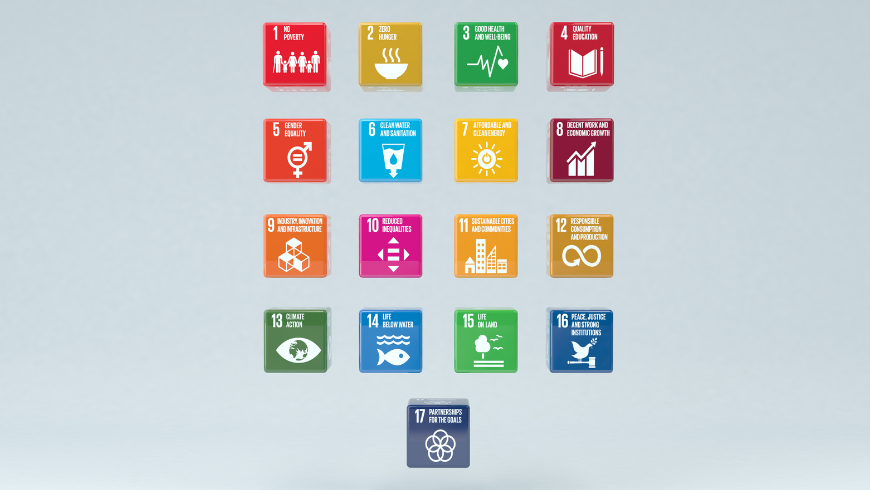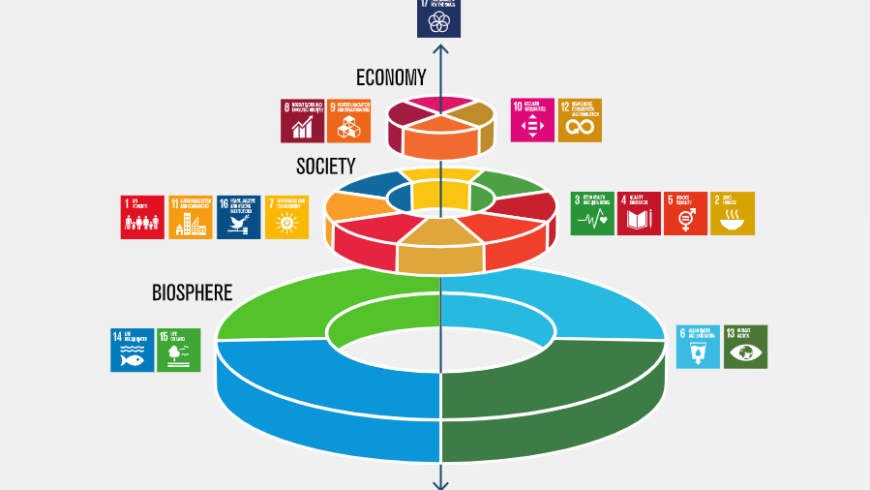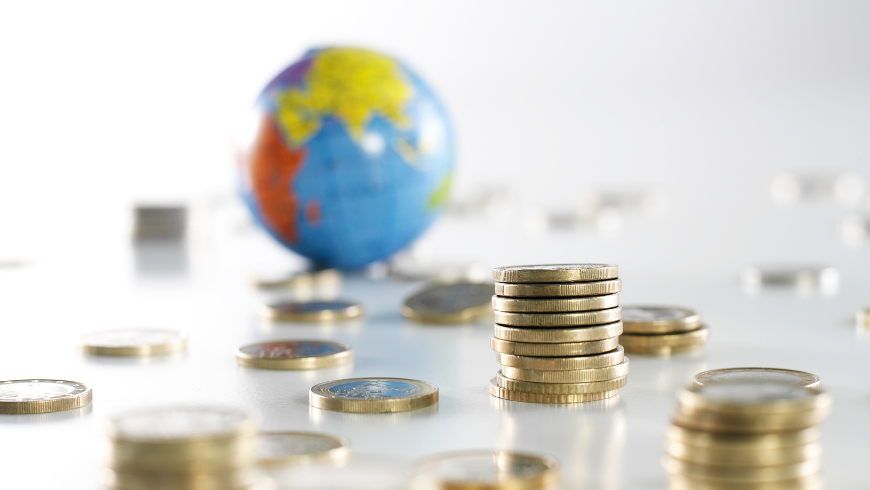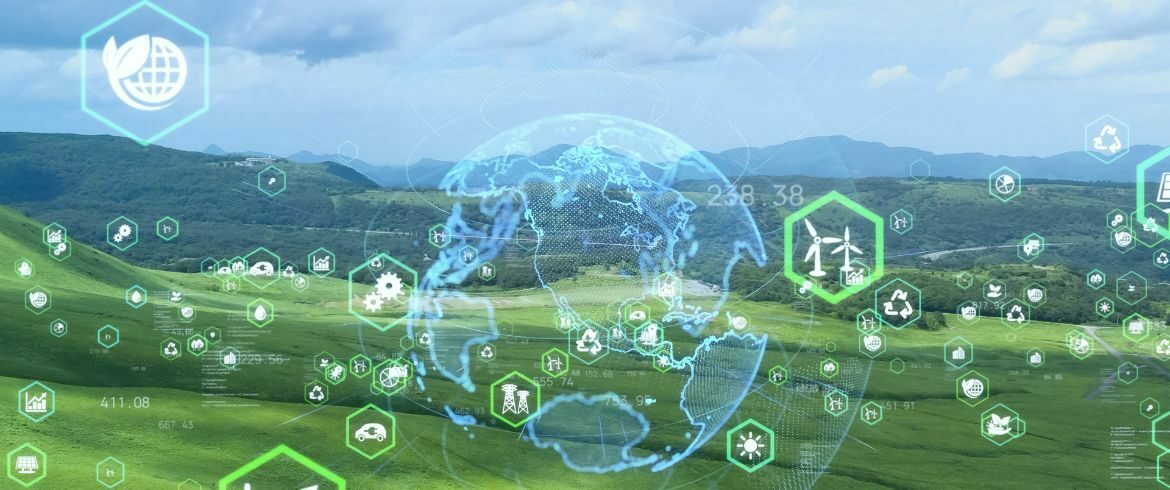A recent OMT research carried out by the Japan International Cooperation Agency has turned the spotlight on the role that the tourism sector plays in the protection of the planet. More precisely, the research highlights the importance of tourism for the achievement of the 17 sustainable development goals of the 2030 Agenda.

The fast-growing tourism sector has a huge impact on the society and the economy of countries. For this impact to be positive, tourism needs to be sustainable. This means that it needs to respect both the environment and the local communities. That’s when it can actively contribute to all the sustainable development goals (SDGs), as shown by this pie chart provided by the Stockholm Resilience Centre.

Tourism And Environmental Goals
Starting from the bottom layer of the pie chart, you can see that sustainable tourism can foster the 4 goals related to the protection of the biosphere. Let’s see how:
- Tourism and SDG 6 – Clean water and sanitation. The tourism sector can be actively involved in responsible and efficient water management, other than carrying out periodic checks of the pollution level.
- Tourism and SDG 13 – Climate action. Tourism significantly contributes to carbon emissions through polluting means of transport like planes, or not so eco-friendly accommodation. The path of Eco-travel might be of considerable help for the protection of the planet.

- Tourism and SDG 14 – Life below water. The protection of marine ecosystems also involves tourism, especially maritime and coastal tourism. Proper management of underwater life leads to economic advantages for both the infrastructure and local communities, who sometimes have marine resources as their main source of income.
- Tourism and SDG 15 – Life on land. Just like marine ecosystems, terrestrial ones deserve particular attention when it comes to preserving their biodiversity. A kind of tourism that engages in the conservation of natural heritage is not only good for tourism itself but also for the health and well-being of both local communities and the flora and fauna of the area.
Tourism And Social Goals
The achievement of environmental goals is the foundation for noticing benefits from the social point of view, too. Therefore, tourism also interconnects with SDGs which have to do with the well-being of society:
- Tourism and SDG 1 – No poverty. The tourism sector, by diversifying the supply of goods and services, has the power to create more and more jobs for the benefit of local communities. Moreover, in terms of tourism development, it can invest in infrastructure which may also be helpful for people who live in poverty.
- Tourism and SDG 2 – Zero hunger. Sustainable tourism is capable of stimulating sustainable food production which comes from local and organic supply chains. Thanks to its infrastructure, it can also contribute to a constant and stable supply of food goods and services in the area.
- Tourism and SDG 3 – Good health and well-being. The connection between tourism, health, and well-being is very strong since travellers tend to choose hospitality structures that put hygiene first. Indirectly, it is also possible to reinvest the taxes generated by tourism in the local people’s healthcare.
- Tourism and SDG 4 – Quality education. By demanding a great workforce, tourism has the potential of favoring quality education through highly professional education programs. In addition, it can raise consumers’ awareness of sustainable development goals.
- Tourism and SDG 5 – Gender equality. Women represent 58% of the people employed in the tourism sector, even if they often have low-qualified or informal roles. Thus, the tourism sector might be a suitable context for empowering women in several ways, helping them to shatter the infamous “glass ceiling”.

- Tourism and SDG 7– Affordable and clean energy. The tourism sector is very energy-intensive. Therefore, it could promote the use of clean and renewable energy, with the result of making local communities participants in the “green revolution”, too.
- Tourism and SDG 11 – Sustainable cities and communities. The places visited by tourists are “real” places, inhabited by citizens with specific needs. This is the reason why it is necessary that tourism engages in making tourist destinations more sustainable, for both visitors and local communities.
- Tourism and SDG 16 – Peace, justice, and strong institutions. A responsible kind of tourism should deal with the harmonious coexistence of different cultures and religions. Consequently, it plays a crucial role in the promotion of human rights and public health.
Tourism And Economic Goals
Responsible tourism, if practiced systematically, can contribute to achieve the sustainable development goals in terms of economy, too. As a matter of fact, it is closely linked with the remaining SDGs of the 2030 Agenda:
- Tourism and SDG 8 – Decent work and economic growth. Tourism is an important sector for global economic growth and it can create jobs in least-developed countries, too.

- Tourism and SDG 9 – Industry, innovation, and infrastructure. Infrastructure and innovation are essential for the development of tourism. Consequently, they are one of the main investments in the sector. Tourism can therefore have an impact on public policy in order to get more eco-friendly and efficient infrastructure.
- Tourism and SDG 10 – Reduce inequalities. Given its deep connection with local communities, tourism is an important weapon against inequalities. In fact, it does not only have an impact on the environment but also on the development of local and rural economies.
- Tourism and SDG 12 – Responsible consumption and production. Through responsible consumption and production, tourism helps to speed up the “green transition”.
To conclude, tourism plays a key role in the achievement of the sustainable goals. By taking a systematic and organized approach, this sector could lead to several changes and make the goals of the 2030 Agenda more and more achievable.




